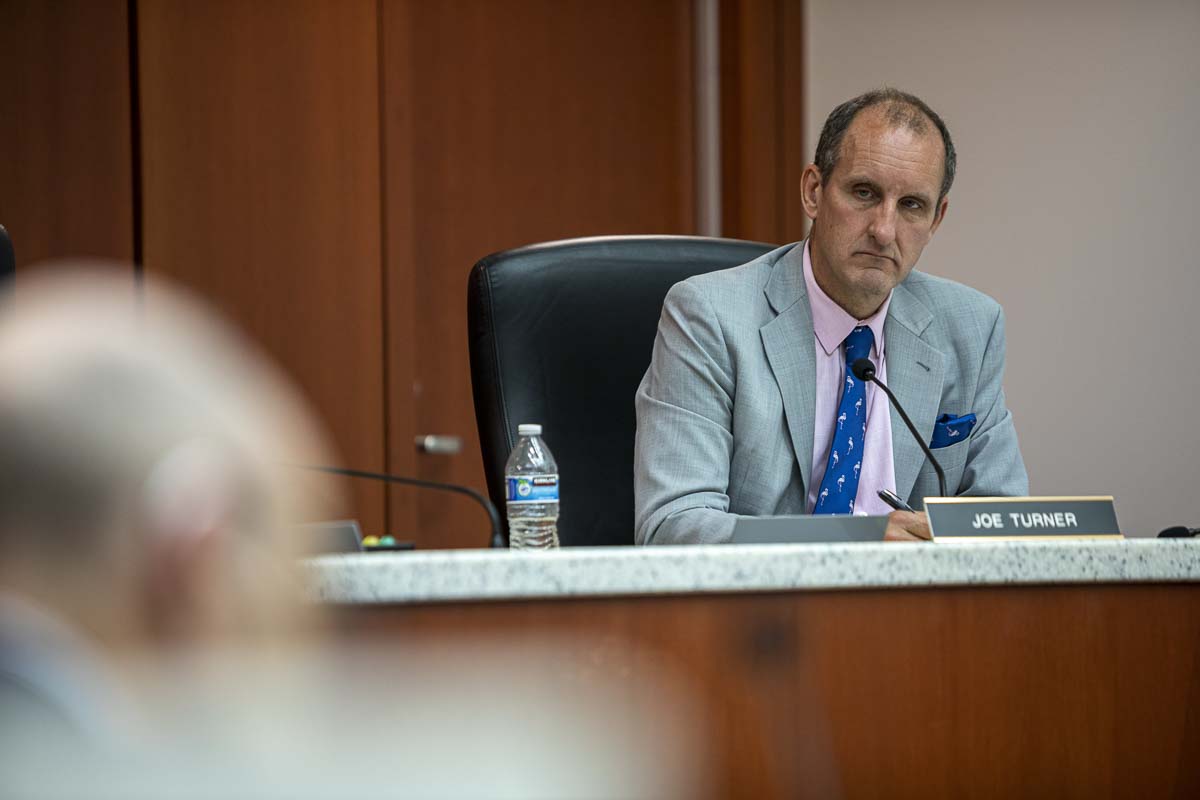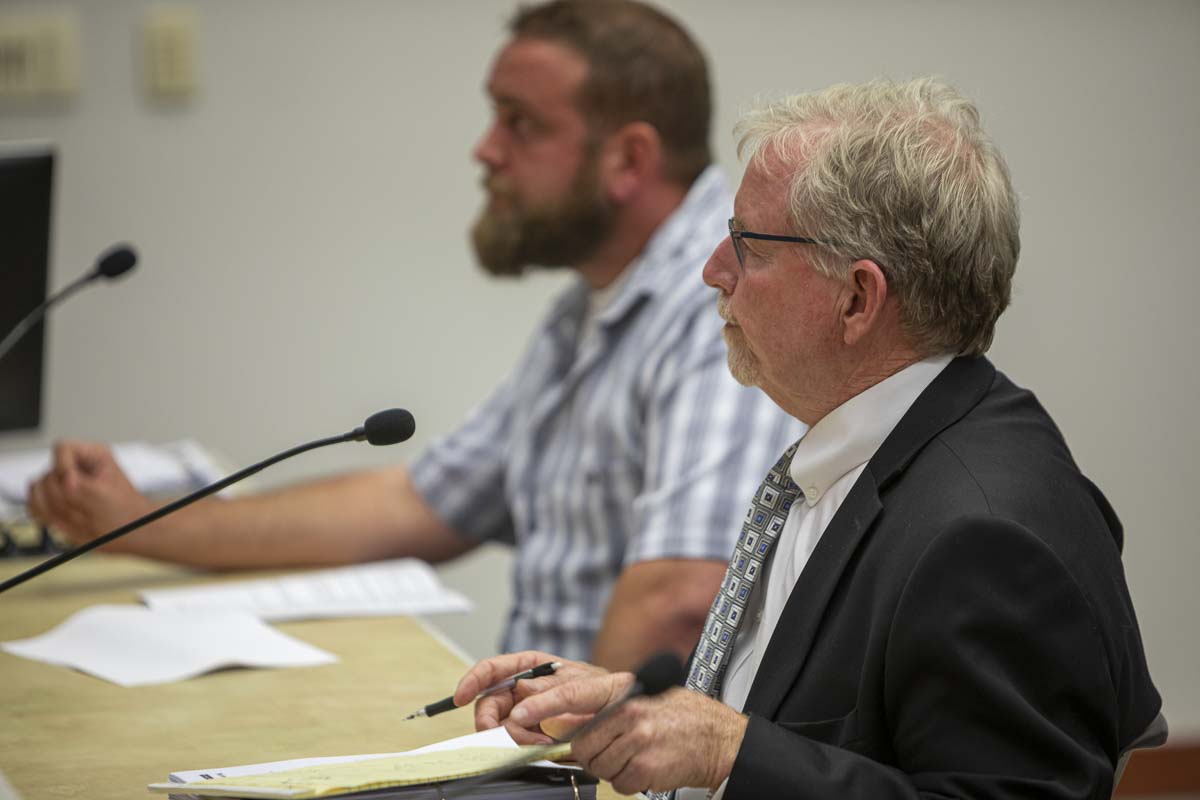County hearings examiner hears testimony from appellant and community, rules in appellant’s favor
UPDATE: Clark County Hearings Examiner Joe Turner, concluded the county’s decision to not accept the preliminary application from the quarry was a violation; ordering the county to continue the process.
“Based on the above findings and discussion, the examiner grants the appeal, reverses the director’s decision, and orders the County to accept a CUP application for extraction within the SMO overlay area on the site if and when the applicant submits such an application.”
The full report can be found here.
VANCOUVER — The Clark County Hearings Examiner Joe Turner heard from JL Storedahl and Sons and community members on the issue of allowing the operators of Yacolt Mountain Quarry to apply for an additional land use permit, Thursday evening.
The hearing is the result of the county’s refusal to allow the application process to initiate now and the quarry operator’s subsequent appeal. The refusal is based on the notion that since the mining of the parcel therein is not permitted to commence until 2028, as per a covenant agreement, this application is not permissible.

That covenant agreement, however, does not explicitly restrict the quarry from applying for the permit early. The mine operator Bo Storedahl has gone on record saying he needs the permit now in order to relocate the overburden on the parcel, but still maintains the plan to mine in “15 or 30 years,” well outside the 10-year covenant agreement.
Community Development Director Mitch Nickolds, and his staff, rejected the pre-application after determining that moving the overburden would be a mining activity and would allow the possibility of further early mining of the site, which is expressly restricted in the covenant.
“Our position is very simple,” said William Lynn, the attorney providing legal representation for Storedahl. “The county code provides that when an applicant makes an application, the county shall do certain things; including processing the application. There’s nothing here that would cause or allow the county to do anything other than that.”
Lynn went on to echo the introductory statements of Turner himself, that the purpose of the hearing was not to address the legitimacy of the application or concerns about the mining operation itself, but rather, decide if processing the application in the first place is permitted; an issue of due process, he said.
“Had the county council intended to say, ‘the applicant can’t apply for anything,’ they certainly could have said that,” Lynn said. “They didn’t. You don’t read in restrictions that aren’t there. You don’t make up limitations that aren’t part of the language.”

In that same vein, the representation for the appellant, made clear their belief that the moving of overburden is helpful and necessary to the operation.
Eric Staley, a principal mining and engineering geologist with GeoDesign, also gave testimony in support allowing the application; citing interconnections with agency procedures and mining practices. Staley provided imaging and data to support the move of overburden prior to actual mining in 10 years time.
Public comments were largely in opposition of approving the ability to apply, and in support of the country’s initial decision, however, a few attendees voiced their support for the quarry operation.
“You listen to Mr. Staley, and he has his wonderful photographs, but if you look really hard and listen really hard to what he said, there was nothing in their that said, ‘You have to have a mining permit now, for this mine to go forward,’” said Dick Leeuuwenburg, president of the East Fork Community Coalition. “They’re just angry because the county finally said, ‘No.’”
“The issue at hand here is that conditional use permit should be accepted by the county, the application. There’s nothing in the covenant that says that it should not be,” said Andrea Smith, of Vancouver. “Therefore, looking at legal languages, the county should do what it would always do.”
Many additional statements were made by community members, expressing a variety of opposed sentiments, most notably many of the hot button issues currently being addressed in the Surface Mining Advisory Committee meetings, better known as the Yacolt Mountain Quarry Forum.
These issues were respectfully acknowledged by Turner, but each time he also explained that many of those existing issues were not relevant to his decision regarding the application process. They would, however, become relevant if, and when the application process may be initiated.
Near the conclusion of the hearing, representation for the county pointed out that background information regarding the mine, and the need more reevaluation, chiefly environmental evaluation, would be needed before the future mining could commence.
They went on to say this was used to interpret the covenant, and the subsequent denial of the application process. Turner responded by inquiry as to the legitimacy of interpretation.
“Is background part of the covenant? Or is the covenant running with the land, the covenant?” Turner said.
“I think the background facilitates the interpretation of the rest of the covenant. Just as the testimony from both the council and the applicant does in the legislative history that supports the adoption,” said Taylor Hallvik, of the Clark County Prosecuting Attorney’s office.
“If we were interpreting a statute I would completely agree with you, but isn’t this a contract?” Turner said.
“I think this is both a contract and a part of the adopting ordinance,” Hallvik said.

Hallvik went on to explain that for the county it is a matter of use. The covenant, and adopting ordinance which refers to it, restrict the use of the parcel for mining. Ergo, you cannot apply for a use that is not allowed, according to the county.
Before the conclusion of the hearing, Bo Storedahl gave statements in an endeavour to address several accusations that he has changed his position.
“My narrative from the beginning hasn’t changed,” he said. “I maintain that that area is needed to function the existing quarry. Most importantly for the storage of overburden. That story hasn’t changed, and the intention to mine beneath that wouldn’t occur until that overburden was removed from the property.”
He went on to reiterate that it is the intention of the quarry to wait until the main pit is mined out to mine the parcel at hand; whether that is at the 10-year mark in December of 2028, or in 15 years or more.
Turner concluded the hearing by explaining that the record would be left open until 5 p.m. on Fri., Aug. 23 and that he will likely reach his decision within two weeks time.




